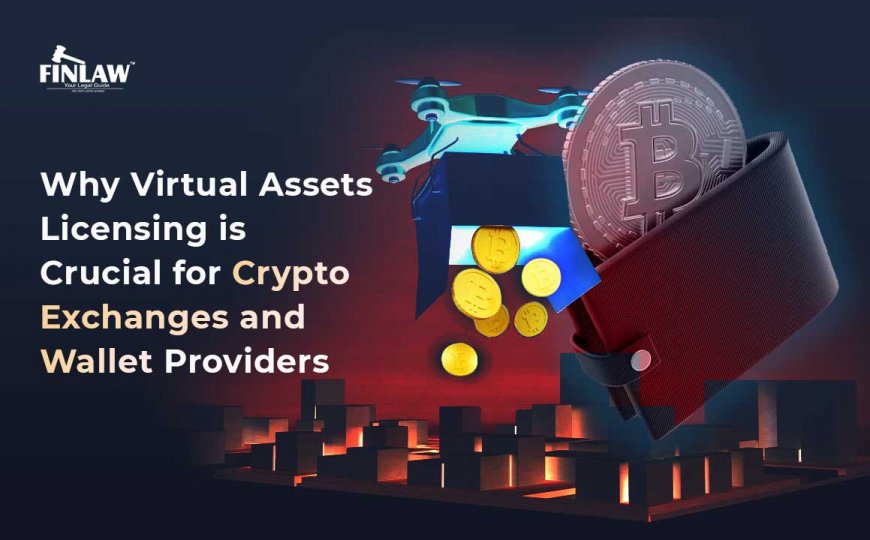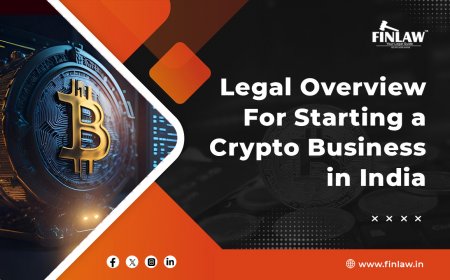Why Virtual Assets Licensing Is Crucial for Crypto Exchanges and Wallet Providers
Discover why virtual assets licensing is vital for crypto exchanges and wallet providers in India. Build trust, comply, and grow securely.

Introduction
Cryptocurrencies and digital assets have transformed global finance, creating both opportunities and risks. But as the market has grown, regulators worldwide have emphasized one central theme: the importance of virtual assets licensing.
For crypto exchanges and wallet providers, licensing is more than just a regulatory formality. It is the foundation for trust, credibility, and long-term survival in an increasingly competitive and highly regulated financial ecosystem.
In India, the regulatory landscape is still evolving, yet licensing and registration requirements — such as compliance with the Financial Intelligence Unit-India (FIU-IND) — are already shaping the way Virtual Asset Service Providers (VASPs) must operate. Understanding why virtual assets licensing is crucial can help businesses align with both domestic and global expectations.
What Is Virtual Assets Licensing?
Virtual assets licensing is the process through which regulators authorize VASPs — including exchanges, custodial wallets, token issuers, and brokers — to provide crypto-related services legally.
Such licences or registrations typically require:
-
AML/CFT Compliance: Implementing Know Your Customer (KYC), customer due diligence, transaction monitoring, and suspicious activity reporting.
-
Capital Adequacy: Maintaining minimum capital reserves to ensure solvency.
-
Custody Standards: Segregating client funds from operational accounts and securing digital assets through robust custody solutions.
-
Operational Transparency: Filing audits, disclosing beneficial owners, and publishing risk disclosures for investors.
-
Technical Safeguards: Implementing cybersecurity frameworks, penetration testing, and data protection measures.
The purpose of licensing is not to stifle innovation, but to bring crypto services within a regulated perimeter, making them safer for both users and the financial system.
Why Virtual Assets Licensing Matters
1. Compliance with FATF Standards
The Financial Action Task Force (FATF) has issued clear recommendations that VASPs must be licensed or registered and supervised. Countries that fail to implement such systems risk being placed on FATF’s “grey list,” which restricts cross-border banking relationships. For Indian exchanges and wallet providers, aligning with FATF expectations through virtual assets licensing ensures international credibility.
2. Enabling Banking and Payment Integration
One of the biggest hurdles for crypto businesses is securing stable banking partners. Licensed entities can demonstrate compliance, making it easier to integrate fiat on-ramps, credit card processing, and payment gateways. Without licensing, exchanges often face account closures, payment restrictions, or high-risk categorization by banks.
3. Safeguarding Customer Interests
Crypto users often worry about hacks, frauds, and rug pulls. A licensed exchange must meet minimum custody and security standards, provide dispute resolution, and maintain segregated client accounts — all of which reassure customers and improve adoption.
4. Reducing Enforcement and Legal Risks
Several exchanges globally have faced shutdowns, fines, or lawsuits for operating without proper authorization. For example:
-
In 2023, multiple unlicensed exchanges were banned in European jurisdictions under MiCA’s transitional rules.
-
In India, FIU-IND issued compliance notices to exchanges serving Indian users without registering as reporting entities.
Licensing mitigates these risks by providing a formal operating framework.
5. Attracting Institutional Investors
Institutional investors — hedge funds, venture capital firms, and asset managers — demand regulatory clarity before committing capital. A licensed platform provides that assurance, unlocking opportunities for partnerships and large-scale investment.
6. Supporting Global Expansion
Licensed VASPs find it easier to expand internationally, as many regulators recognize or fast-track entities that are already supervised elsewhere. For example, a Dubai VARA-licensed exchange often gains smoother entry into other GCC markets.
7. Strengthening Systemic Stability
Licensing ensures regular audits, operational reporting, and supervisory checks. This reduces risks of insolvencies like the FTX collapse, where lack of oversight allowed governance failures to spiral into a global crisis.
Virtual Assets Licensing in India: The Current Framework
India has not yet introduced a single unified virtual assets licensing framework. However, key developments highlight how regulation is taking shape:
-
FIU-IND Registration:
-
All Virtual Digital Asset Service Providers (VDASPs) catering to Indian users must register with the Financial Intelligence Unit-India.
-
They must follow AML/CFT obligations, including suspicious transaction reporting and record-keeping.
-
Taxation Framework:
-
The 2022 Union Budget introduced a 30% tax on Virtual Digital Asset (VDA) profits and 1% TDS on transactions, indirectly pushing for formalization.
-
Policy Divergence:
-
The Reserve Bank of India (RBI) remains skeptical of private cryptocurrencies, raising concerns about financial stability.
-
SEBI and the Ministry of Finance, however, continue exploring frameworks for tokenized assets and investor protection.
-
Future Possibilities:
-
India is likely to move towards a dedicated licensing regime that aligns with FATF’s global standards, similar to MiCA in the EU.
-
In the interim, FIU-IND registration is the most critical compliance requirement for exchanges and custodial wallet providers.
Global Best Practices in Virtual Assets Licensing
European Union – MiCA
The Markets in Crypto-Assets Regulation (MiCA) has established one of the most comprehensive frameworks, requiring authorization for all Crypto Asset Service Providers (CASPs). It covers stablecoins, utility tokens, and service providers, setting a global gold standard.
Dubai – VARA
Dubai’s Virtual Assets Regulatory Authority (VARA) licenses entities across trading, brokerage, custody, and advisory services. Its framework is designed to balance investor protection with innovation, making Dubai a hub for crypto firms.
Singapore & South Korea
Both countries have tightened licensing requirements in recent years, particularly around AML/CFT, data protection, and consumer rights. These jurisdictions illustrate how clear licensing frameworks attract international firms while protecting users.
Case Study: Licensed vs. Unlicensed Platforms
-
Licensed Exchange (Example: VARA-licensed in Dubai):
Operates with bank partnerships, insurance coverage, and institutional-grade custody. Customers trust the platform, and it scales globally.
-
Unlicensed Exchange (Example: Offshore, unregistered in India):
Faces bank account freezes, compliance notices from FIU-IND, and reputational risks. Customers hesitate to deposit funds, limiting growth.
This contrast shows why virtual assets licensing is not just a regulatory checkbox but a business growth strategy.
Preparing for Licensing: A Step-by-Step Guide
For exchanges and wallet providers operating in or targeting India, here’s a roadmap:
-
Register with FIU-IND – Immediate compliance requirement for AML obligations.
-
Build an AML/CFT Program – Travel Rule compliance, transaction monitoring, and suspicious activity reporting.
-
Appoint Compliance Leadership – Principal Officer and AML Reporting Officer must be designated.
-
Implement Secure Custody Practices – Cold/hot wallet segregation, multi-signature, and insurance coverage.
-
Ensure Transparency – Beneficial ownership disclosures and financial audits.
-
Develop Product-Specific Compliance – Map rules for spot trading, staking, and derivatives.
-
Engage Regulators – Establish early communication to prepare for upcoming licensing frameworks.
Impact on Users and Market Competition
-
For Users: Licensing ensures better fund protection, faster dispute resolution, and reduced fraud risks.
-
For the Market: Licensed entities compete on service quality, security, and innovation instead of regulatory arbitrage.
-
For Regulators: Licensing provides visibility into systemic risks, ensuring market stability.
FAQs on Virtual Assets Licensing
Q1: Does India have a crypto licence today?
Not yet. FIU-IND registration is mandatory, but a dedicated virtual assets licensing regime may emerge soon.
Q2: Why is licensing important for wallet providers?
Wallet providers hold customer assets, making them critical to AML/CFT monitoring and asset safety. Licensing builds user trust and regulatory credibility.
Q3: Can unlicensed exchanges operate in India?
Technically, offshore platforms can serve Indian users, but without FIU registration, they face compliance notices, enforcement actions, and banking restrictions.
Conclusion
Virtual assets licensing is not a hurdle — it’s a catalyst for growth, trust, and innovation in the crypto industry. In India, while a comprehensive licence does not yet exist, FIU-IND registration and AML/CFT compliance are essential for exchanges and wallet providers.
Globally, frameworks like MiCA in the EU and VARA in Dubai show how licensing can foster innovation while safeguarding investors. For Indian businesses, aligning early with these international standards will secure long-term competitiveness.
In the coming years, licensing will define who survives and scales in the digital assets space. Those who treat compliance as a strategic advantage will thrive, while those who delay may find themselves excluded from the future of finance.
What's Your Reaction?



















